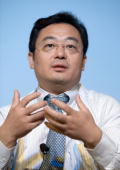 |
| Liu Dian Bo |
China's pharma corruption crackdown hasn't helped multinationals' top lines, which only recently began returning to normal after taking a hit last fall. But it may be opening up an opportunity for domestic drugmakers and their owners--like new Billionaire Club member Liu Dian Bo--to make a splash.
Earlier this week, Liu joined the ranks of biopharma's richest when shares in the company he co-founded and currently chairs, Luye Pharma Group, closed at a record, Bloomberg reports. 49-year-old Liu, who controls about 31% of the drugmaker, sold about $44 million in stock in the drugmaker's IPO last month. With the shares soaring Friday, his remaining stake racked up enough gains to push him over the $1 billion threshold.
And with Luye generating 99% of its revenue in the burgeoning China market, Liu only expects that fortune to keep mounting. "The pharmaceutical market in China will continue to grow rapidly in the next 20 years," he told the news service last month. "We have a population that's becoming older and older and their demand for health-related products is huge."
Liu isn't the only industry giant to make his fortune in an emerging market. For one, Sun Pharma founder Dilip Shanghvi, worth a cool $9.2 billion as of last year, has made his name in a rapidly expanding Indian market since launching Sun in 1982.
But unlike many local drugmakers from developing countries, Luye isn't building its stake in China's drug market on low-margin generics. It was one of the first Chinese pharma companies to bolster its R&D capability and produce innovative medicines, Bocom International analyst Milo Liu told Bloomberg.
"My childhood dream was to be a doctor and save lives," Liu told the news service. "Probably because of that I was never content to just make generic drugs. Innovation is the future."
And as the analyst noted, a $489 million bribery scandal that hit GlaxoSmithKline ($GSK) last summer--touching off a number of other investigations into foreign drugmakers--has left China's domestic companies a little more room to compete. The "ongoing anti-corruption campaign may drive domestic drugs to gain market share from imported drugs," he said.
- see the Bloomberg story
Special Report: Fierce's 10 top biotech billionaires
Related Articles:
Jumping into global M&A mix key to India growing its pharma industry
China probes of Glaxo, Sanofi, others put big chill on key growth market
Would GSK pull out of China altogether?